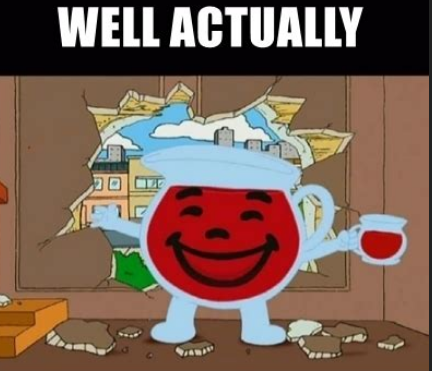Listening to yourself
One of the things that astonishes many beginner and intermediate violinists is how they sound on a recording versus how they think they sound. They say the phone recordings just don’t do their music justice. They swear it’s the acoustics of the room. Something about the walls makes their intonation sound off. No way they sound like that in real life.
Then someone with a little more experience comes along and tells them the truth: the recording doesn’t lie. There’s an initial “you can’t be serious!” followed by steady improvement.

Learning that, well actually, the recording doesn’t lie is an insight that’s about as welcome as Kool-Aid Man is here
There’s something disorienting about listening to yourself play the violin. It’s different from instruments like the piano because the violin is right up against your head. Poets point out the instrument is held close to your chest, right by your beating heart. Playing the violin is more like singing than strumming on a guitar, because the sound is so much close to your head and ears. (By the way, if you’ve never listened to a recording of yourself sing or speak, you should try that right now. You will never be the same.)
There’s something about listening in the moment, while you’re playing the violin, that erases the little flaws. All the little intonation slips and inaccuracies in shifting and shaky bowings disappear because you’re so focused on this musical phrase, and then the next, and the next. Like seeing your lover– you don’t care about the mole on their temple or the little wrinkle on their face. All you see is your special someone.
The recording doesn’t lie, though.
Unfortunately for our egos, being honest about the little imperfections is also love. Fortunately for our egos, there’s no emotional weight when the camera and the microphone show you every flaw in your performance. Turns out that most people don’t mind hearing all the ways they messed up, if the person telling them isn’t a person at all.
I’m starting to notice how little I hear about watching ourselves when getting better at something. We know athletes watch their game tapes, musicians listen to their recordings, dancers watch their choreography, writers read and re-read their own work.
Yet in many areas I learn about, it’s often something I had to find out for myself. I had to rediscover this lesson repeatedly before I started to connect the dots and realize that being able to properly evaluate your own performance is a superpower that comes from paying attention to yourself.
We often treat recording ourselves and artistic expression as a reward for advanced students who’ve already mastered the basic techniques, but I really wonder whether it might be worthwhile flipping things around: starting by spending all your time on paying attention to what seems good to you and what doesn’t, instead of drilling nothing but the basics from the get-go.